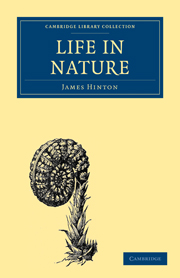Book contents
- Frontmatter
- Contents
- INTRODUCTION
- CHAPTER I OF FUNCTION; OR, HOW WE ACT
- CHAPTER II OF NUTRITION; OR, WHY WE GROW
- CHAPTER III OF NUTRITION; THE VITAL FORCE
- CHAPTER IV OF LIVING FORMS; OR, MORPHOLOGY
- CHAPTER V OF LIVING FORMS; THE LAW OF FORM
- CHAPTER VI IS LIFE: UNIVERSAL?
- CHAPTER VII THE LIVING WORLD
- CHAPTER VIII NATURE AND MAN
- CHAPTER IX THE PHENOMENAL AND THE TRUE
- CHAPTER X FORCE
- CHAPTER XI THE ORGANIC AND THE INORGANIC
- CHAPTER XII THE LIFE OF MAN
- CHAPTER XIII CONCLUSION
- APPENDIX: AN ATTEMPT TOWARDS A MORE EXTENDED INDUCTION OF THE LAWS OF LIFE
- Frontmatter
- Contents
- INTRODUCTION
- CHAPTER I OF FUNCTION; OR, HOW WE ACT
- CHAPTER II OF NUTRITION; OR, WHY WE GROW
- CHAPTER III OF NUTRITION; THE VITAL FORCE
- CHAPTER IV OF LIVING FORMS; OR, MORPHOLOGY
- CHAPTER V OF LIVING FORMS; THE LAW OF FORM
- CHAPTER VI IS LIFE: UNIVERSAL?
- CHAPTER VII THE LIVING WORLD
- CHAPTER VIII NATURE AND MAN
- CHAPTER IX THE PHENOMENAL AND THE TRUE
- CHAPTER X FORCE
- CHAPTER XI THE ORGANIC AND THE INORGANIC
- CHAPTER XII THE LIFE OF MAN
- CHAPTER XIII CONCLUSION
- APPENDIX: AN ATTEMPT TOWARDS A MORE EXTENDED INDUCTION OF THE LAWS OF LIFE
Summary
The following pages contain a popular exposition of some of the most interesting questions which Living Bodies suggest, and are designed to present in a brief compass and easily-intelligible form a general view of them, which, it is believed, will be found more simple and more satisfactory than the ideas commonly entertained. All thoughtful persons feel that the subject of Life cannot be satisfactorily discussed on physiological grounds alone, but that it opens up some of the deepest problems which surround our existence, and raises questions the practical importance of which cannot be overestimated. I have therefore endeavoured to give a brief expression to the views which I entertain on some of these questions; feeling that science, happily for us, cannot, even if she would, confine herself to the mere relations of physical objects or material forces; but that she has a message for us, not less from heaven because conveyed through earthly instruments, respecting our inmost nature and our highest relations. Science, in a word, can teach us—it is her loftiest function and her greatest boon—not only respecting nature, but respecting ourselves, and so can enable us to look with purged eyes on objects which only to our blinded senses can seem trivial. We lose our privilege, we fall short of our duty, if we do not seek to gather these fruits wherever they are presented to our hand.
- Type
- Chapter
- Information
- Life in Nature , pp. xi - xviPublisher: Cambridge University PressPrint publication year: 2009First published in: 1862

